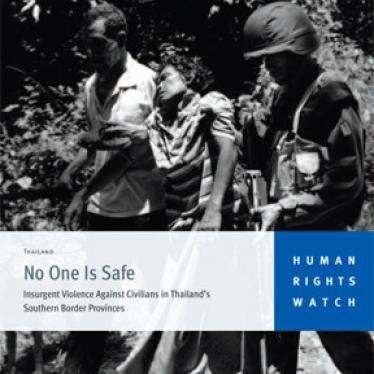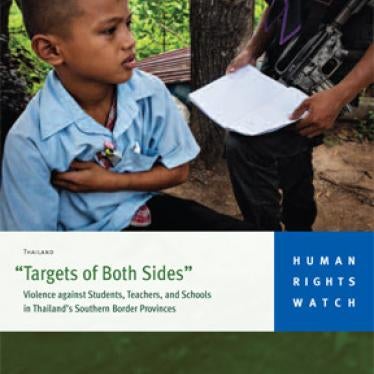(New York) - Separatist insurgents in Thailand's southern border provinces should immediately end attacks on civilians, Human Rights Watch said today. Since January 2011, insurgent groups have carried out a wave of bombings, in violation of the laws of war, that have killed large numbers of civilians and caused widespread fear in the population.
On February 13, insurgents detonated an improvised explosive device (IED) hidden in a pickup truck in front of Siam City Bank in Muang district, Yala province, wounding four soldiers and 13 ethnic Thai Buddhist civilians. The blast caused a massive fire that destroyed almost an entire block of shop-houses in a provincial commercial center.
"The leaders of separatist insurgent groups need to rethink their tactics, which are abhorrent, illegal, and completely unjustifiable," said Brad Adams, Asia director at Human Rights Watch. "There is no excuse for indiscriminate or deliberate attacks against civilians."
Human Rights Watch learned that the explosive device consisted of rigged fuel tanks with four cooking-gas canisters, each packed with metal rods and at least 30 kilograms of explosives. Three of the canisters went off while the fourth malfunctioned and did not explode. This bombing followed a deadly attack on January 25, in which nine Thai Buddhist civilians were killed and two seriously wounded by a roadside bomb in Yala's Yaha district.
Since January 2004, Thailand's southern border provinces of Pattani, Yala, and Narathiwat have been the scene of a brutal armed conflict. Of the 4,370 people killed, about 90 percent have been civilians from both the ethnic Thai Buddhist and ethnic Malay Muslim populations.
Some recent insurgent attacks appear intended to spread terror among the Buddhist Thai population, in violation of the laws of war. For example, on February 10, separatist insurgents shot dead Bunthian Bupphawas, Am Kuarkoon, and Sawat Kuarkoon in Thung Yangdaeng district of Pattani and then burned their bodies. Bunthian was a teacher at a government school in Yala's Bannag Sta district. Schools, seen as government entities, have often been the objects of insurgent attacks. On February 3, six separatist insurgents in a pickup truck opened fire with assault rifles on a group of about 50 Thai Buddhist civilians who were walking on Tha Kham-Nam Bo road in Pattani's Panare district, killing five people and wounding four others, including a 12-year-old boy.
The Pejuang Kemerdekaan Patani insurgents in the loose network of BRN-Coordinate (National Revolution Front-Coordinate) are guided by a militant Malay nationalism and Islamist ideology. They claim that Thailand's southern border provinces are not the land of Buddhist Thais. They seek to liberate what they call Patani Darulsalam (Islamic Land of Patani) forcibly from what they contend is a Buddhist Thai occupation with a campaign of violence and terror. Their aim is to drive out the Buddhist population, keep Muslims under control, and discredit the Thai authorities.
Human Rights Watch has repeatedly condemned laws-of-war violations by the separatist insurgents in the southern border provinces. A fundamental principle of the laws of war is the distinction between civilians and military objectives. The insurgents claim that the civilians attacked are part of a larger Buddhist Thai population, which is participating in the hostilities, or that their interpretation of Islamic law permits such attacks.
But the laws of war allow no such defense or justification for attacks on civilians or attacks that do not discriminate between military personnel and civilians. The laws of war also prohibit insurgent tactics such as reprisal attacks against civilians and captured combatants, summary execution of civilians or captured combatants, mutilation or other mistreatment of the dead, and attacks directed at civilian objects, such as schools.
Human Rights Watch also remains deeply concerned by ongoing violations of human rights law and the laws of war by government security forces and militias. Killings, enforced disappearances, and torture cannot be justified because they are in reprisal for insurgent attacks on the ethnic Buddhist Thai population and security personnel. This situation has been reinforced by an entrenched culture of impunity for human rights violations by officials in the southern border provinces. The government has yet to prosecute successfully any officials or security force personnel for attacks or other abuses against ethnic Malay Muslims alleged to be involved in the insurgency.
"Separatist insurgents might claim that abuses by the security forces justify their attacks, but the Thai government should not allow its troops to adopt the same logic," Adams said. "The government has promised to hold soldiers accountable, but it continues to shield its troops from criminal responsibility. This will only further intensify this terrible cycle of reprisal violence."








